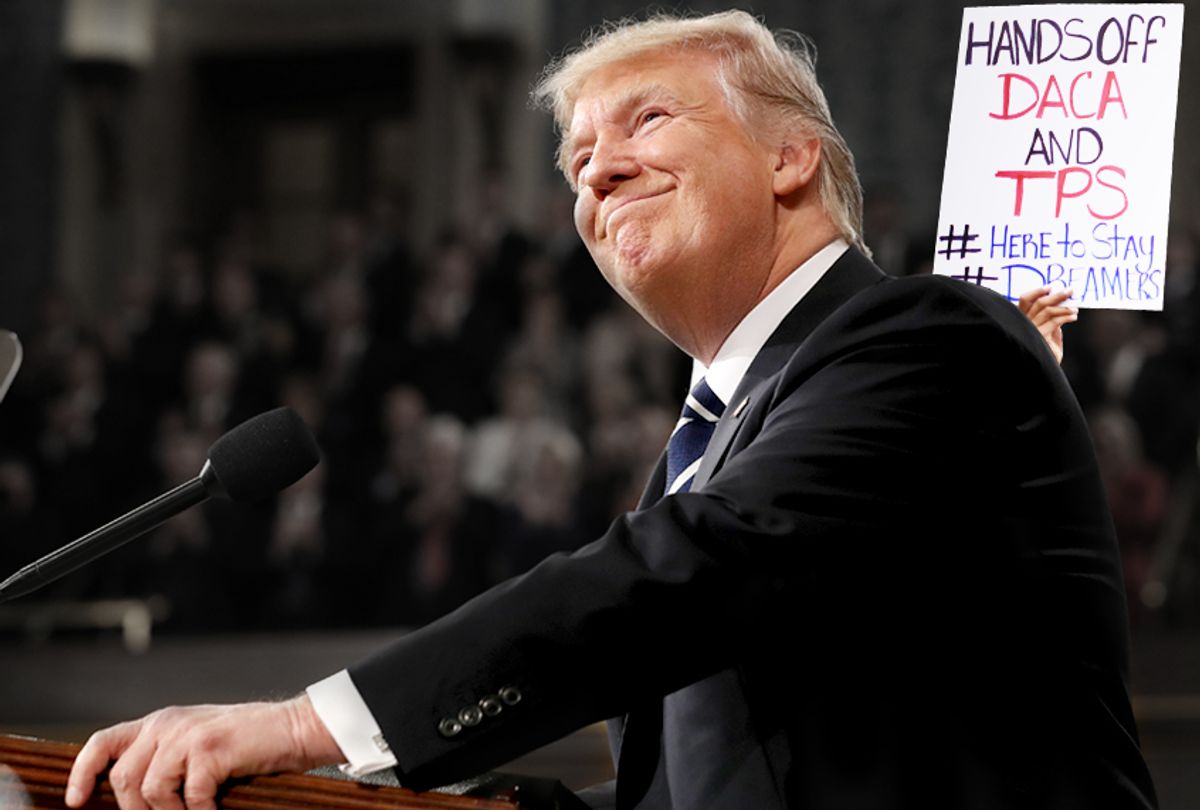Passage of yet another continuing resolution to fund the government temporarily – the fourth such measure in four months – without an explicit deal for the undocumented immigrants granted a reprieve from deportation under DACA is nothing to celebrate for either party. Senate Democrats, backed into a position whose unstable politics they never had the wherewithal to withstand, capitulated to the White House’s original offer, deeply infuriating their base. Senate Republicans, unwilling to deal with the pesky task of governing the country, were forced to once again kick the can on funding the military while giving up their biggest bargaining chip, the 9 million low-income children whose health care they were willing to deny by failing to fund the CHIP program. Debating who “won” or “lost” and bickering over the merits of “caving” does little to solve the continuing crisis.
With the government funded for the next three weeks and CHIP funded for the next six years, negotiations on immigration immediately continued on Monday. Red-state Democratic senators like Joe Manchin of West Virginia and Doug Jones of Alabama were ushered to the White House to discuss next steps. Democrats must not squander this opportunity.
As if disappointing DACA recipients who may face deportation in a matter of weeks (some, whose protections have lapsed, already wait in fear) weren’t enough, Democrats’ three-day stunt has elevated the political risks they face this fall if they fail to pass a deal. Voting for a stopgap spending bill only three days after the government shut down makes Democrats once again look weak. The fired-up base who took to the streets by the hundreds of thousands over the weekend -- in numerous one-year Women's Marches that went largely unnoticed by the media -- is likely to remember unless Democrats finally decide to play hardball.
This isn't much of a reprieve: The government is only open for another 16 days. Democrats should use every opportunity, most importantly Donald Trump’s first State of the Union address, to aggressively campaign for their alternative during the entirety of that period. And now they must offer a clear alternative.
Announcing the agreement to reopen the government on Monday, Senate Minority Leader Chuck Schumer, D-N.Y., said that Majority Leader Mitch McConnell, R-Ky., had assured him that the immigration bill that should be voted on by Feb. 8 (absent any other agreement) will be a bipartisan deal. But the only legislation that has officially been offered by any senators on either side of the aisle comes from immigration hardliners Tom Cotton, R-Ark., and David Perdue, R-Ga., and is largely focused on decreasing the levels of legal immigration.
Right now, Democrats in the Senate have no legislation that they can even offer as a starting point for negotiations. The much-talked-about bipartisan pony that President Trump first seemed to accept and then rejected, offered up by Democratic Sen. Dick Durbin of Illinois and South Carolina Republican Sen. Lindsey Graham, was never more than talk. No draft legislation has ever been released for examination.
Come Feb. 8, Republicans in Congress and the White House will be united around a singular system that more closely resembles legal ethnic cleansing than comprehensive immigration reform. Whether the GOP won the first shutdown battle of the Trump era won’t matter when Republicans offer an immigration bill that codifies limited protections for DACA recipients – who are, importantly, only a small subset of the so-called Dreamers brought to the U.S. without documentation as children – but also drastically cuts legal immigration, ends the family reunification program demonized by hardliners as “chain migration,” and eliminates the diversity visa lottery, a program that heavily impacts legal immigrants from those African nations Trump derided as “shitholes.”
It won’t be enough for Democrats to simply vote "no" on such a disastrous and seemingly race-based bill, even if they hold steady on another government shutdown, unless they have something else to offer. It doesn’t even have to have a realistic chance of passing. Indeed, it might be politically helpful if Democrats in the Senate offered a plan that was as extreme (to the left) as the one advocated by anti-immigration hardliners like Tom Cotton, White House dark wizard Stephen Miller and the president himself. It’s a starting point for negotiation, after all.
With this shutdown, Americans have gained a useful lesson in the intransigence of the Republican Party, but how much was learned that wasn’t already known? Absent a sustained Democratic push that results in actual legislation, McConnell has little reason not to offer the hardline Cotton bill as a "bipartisan solution." After all, Republicans, despite controlling the entirety of the federal government, have little incentive to keep government functioning. Its dysfunction serves the GOP’s message that government is fundamentally broken and inherently bad. It’s hard to negotiate with such bad faith on clear display, but such is the hand that Democrats have been dealt. Elections still do have consequences. The minority party would be best served to get real and , turn their complaints into concrete policy before they pay the ultimate political price (once again).
For starters, Democrats can learn a lesson from the marginalized Arab-Israeli lawmakers who were booted from Vice President Mike Pence's address to the Knesset on Monday for holding signs of protest.
Politics is largely theater. The first government shutdown, with CHIP funding still on the line, was perhaps not the best stage for the Democrats' attempt at a theatrical confrontation over DACA. Now they now have no choice but to keep the show going.

Shares